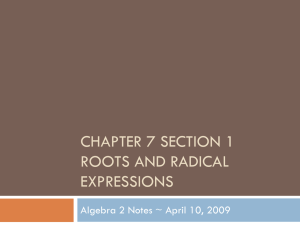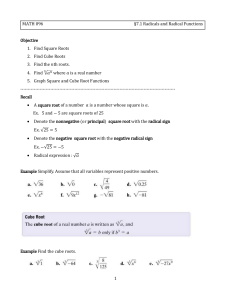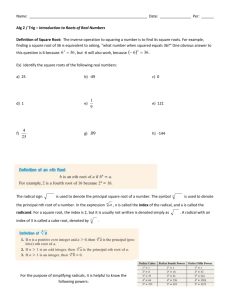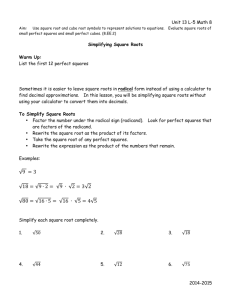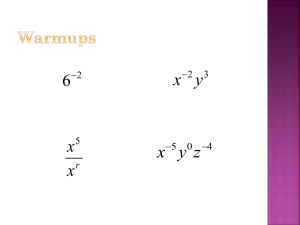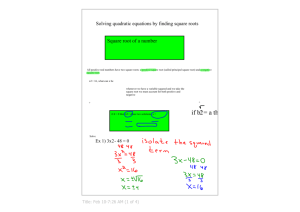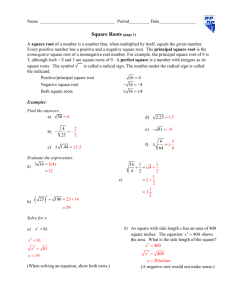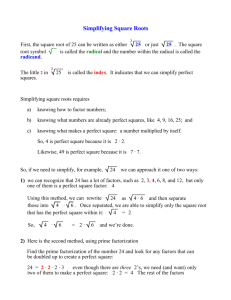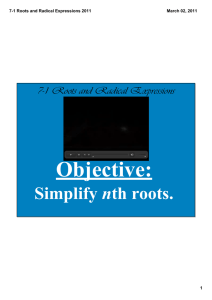Roots of Real Numbers and Radical Expressions
advertisement
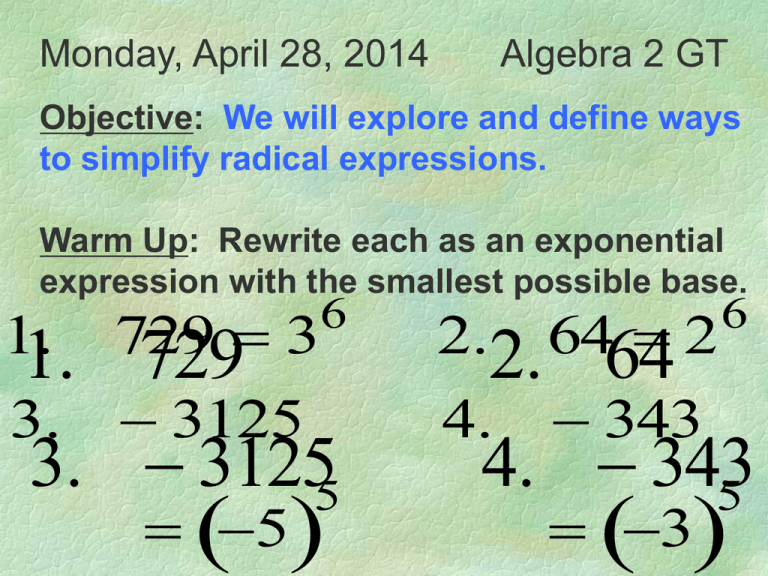
Monday, April 28, 2014 Algebra 2 GT Objective: We will explore and define ways to simplify radical expressions. Warm Up: Rewrite each as an exponential expression with the smallest possible base. 1. 729 3 1. 729 2.2. 6464 2 3. 4. 6 3125 3. 31255 5 6 343 4. 343 5 3 Monday, April 28, 2014 Algebra 2 GT Complete the “7.1 Review” worksheet, #1 – 12 all. Check answers to the Exp/Log Review Packet Unit Test on Wed 4/30 Roots of Real Numbers and Radical Expressions Sections 7.1 and 7.4 – Facts and Examples radical sign 1. index n a radicand 2. The positive root of a number is known as the PRINCIPAL root. So, the principal fourth root of 16 is 2 (because 24 = 16). 3. What do you notice? 4. Even roots will only yield positive answers, and we ensure this by using the absolute value bars. 5. Odd roots can be positive or negative. Why is this? Because 2 8 3 3 8 2 Even though 2 4, 4 2 because we will only work with the principal roots. 2 2 6. What operation is associated with taking a root? In other words, what is the underlying math involved in this simplification? 3 x y x y 6 21 2 7 Therefore, another way to express roots is using RATIONAL (fraction) EXPONENTS. n a a 1 n n and a m a a n m m n 7. Do you recall these old exponent rules? a a a m n mn m a mn a n a a a m n mn ab a b m m a a m b b m 1 a m a m m m 8. Here’s a hint for simplifying with rational exponents: Always rewrite numbers in exponential form, using the smallest base possible. 3 3 27 = 2 4 625 = 25 = 5 64 = 2 8 = 3 4 6 =2 Definition of th n Root For any real numbers a and b and any positive integers n, n if a = b, then a is the nth root of b. ** For a square root the value of n is 2. Notation index 4 Radical sign 81 radicand Note: An index of 2 is understood but not written in a square root sign. 4 Simplify 81 To simplify means to find x in the equation: 4 x = 81 Solution: 4 81 = 3 Principal Root The nonnegative root of a number; only use the positive value when the square root symbol is given; however, use both square roots when you choose to take the square root (as part of solving) or when the plus/minus symbol is given (as shown on the next slide). 64 Principal square root 64 Opposite of principal square root 64 Both square roots Examples 1. 169 x 4 2. - 13 x 2 2 8 x 3 4 13x 8 x 3 2 2 8 x 3 2 2 Examples 3. 4. 3 125 x 3 6 3 m n 3 3 5 x 3 2 3 5x 2 mn mn 3 Taking th n roots of variable expressions: Using absolute value signs If the index (n) of the radical is even, and the power under the radical sign is even, yet the resulting power is odd, then we must use an absolute value sign. Examples Odd Even 1. 4 Even Odd Even 2. an an 4 6 xy 6 2 Even xy 2 Odd Even 3. 2 x 6 x Even 3 Odd Even 4. 6 3 y 2 18 3 - y 3 2 Even 3 - y 3 2
